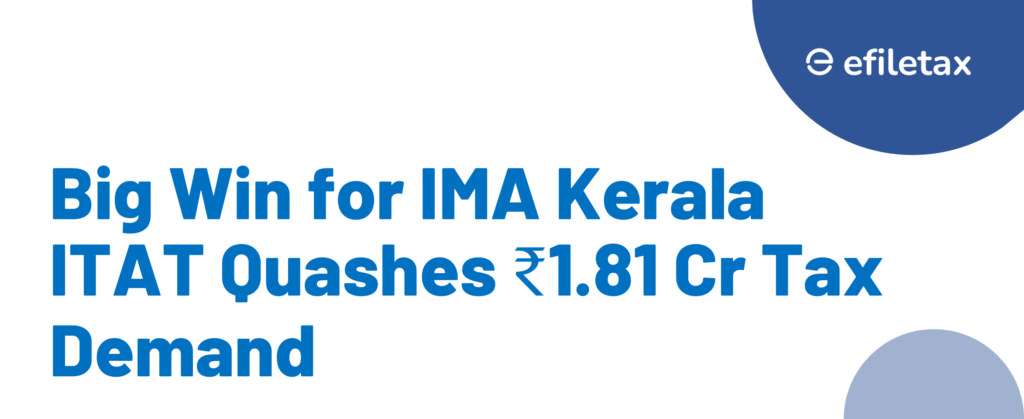
ITAT Relief to IMA Kerala Key Takeaways for Tax-Exempt Professional Bodies
The focus keyphrase “ITAT relief to IMA Kerala” has gained traction after the Income Tax Appellate Tribunal (ITAT), Cochin bench, ruled in favour of the Indian Medical Association (IMA), Kerala State Branch, offering relief from a ₹1.81 crore tax demand for AY 2016–17.
This case sheds light on how Section 11 and 12 exemptions apply to charitable and professional organizations—and where tax authorities may challenge them.
What Was the IMA Kerala Case All About?
- Assessment Year: 2016–17
- Disputed Income: ₹1.81 crore
- Claim by IMA: Entire income was from medical education programs and received as donations—fully exempt under Section 11.
- AO’s View: Alleged violation of Section 13 due to benefits given to trustees and members.
ITAT Ruling: Why It Favoured IMA Kerala
The ITAT Cochin Bench held that:
- IMA Kerala is registered under Section 12AA and qualifies as a charitable institution.
- The educational activities and programs conducted were within the charitable purpose of “medical relief” and “education” under Section 2(15).
- There was no personal benefit or profit-motive proven by the Assessing Officer.
- Donations and training programs did not amount to commercial activity.
📌 Result: The ₹1.81 crore addition was deleted.
Legal Basis Cited by ITAT
- Section 11: Income from property held for charitable or religious purposes is exempt if used accordingly.
- Section 2(15): Defines “charitable purpose” to include medical relief and education.
- CBDT Circular No. 11/2008: Clarifies non-profit entities conducting training/education are eligible for exemption.
- No breach of Section 13(1)(c): As no undue benefit to members or trustees was found.
Expert View: Practical Insight for Professional Bodies
“This judgment reinforces that intention and utilization matter more than just revenue generation. Even income from workshops or donations won’t lose exemption if used solely for approved charitable purposes.” — CA Vishal R., Tax Expert
When Can Income of a Trust Lose Exemption?
| Condition | Effect |
|---|---|
| Funds used for private benefit | Exemption denied under Section 13 |
| Activities driven by profit motive | May be treated as business income |
| Lack of registration under 12AA/12AB | Entire income taxable |
| Failure to file audit report (Form 10B) | Loss of exemption |
| Income not applied as per Section 11(1) | Partial exemption loss |
What This Means for Other Trusts & Associations
- Maintain clear purpose-driven activities aligned with Section 2(15).
- Avoid any personal benefit or related party transactions.
- Keep records of programs, expenses, and donations.
- Ensure timely filing of Form 10B and returns.
- Stay updated with CBDT and judicial clarifications.
FAQs on ITAT Relief and Tax Exemption
Q1. Can a professional association claim charitable status?
Yes, if its main objective is education or public welfare without profit motive.
Q2. Is income from training/workshops taxable?
If conducted as part of charitable purpose and without profit motive, it remains exempt under Section 11.
Q3. What happens if trustees benefit from funds?
The trust may lose exemption under Section 13(1)(c), leading to full taxation.
Summary for Google Snippet
The ITAT provided relief to IMA Kerala in a ₹1.81 crore tax case, affirming that medical education activities qualify for exemption under Section 11, provided there’s no profit motive or private benefit.
Conclusion: Ensure Tax Compliance with Confidence
The ITAT relief to IMA Kerala underscores the importance of aligning operations with charitable objectives and maintaining compliance with Section 11–13 provisions.